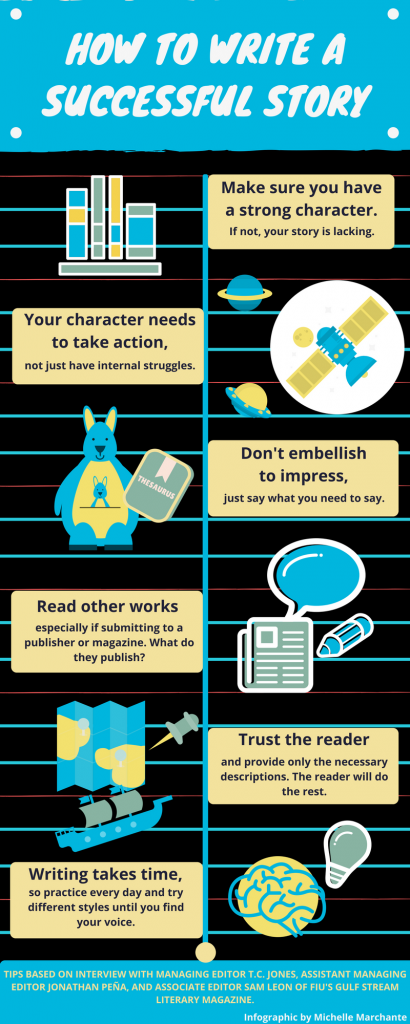Michelle Marchante/News Director
A story is nothing without successful characterization, according to three editors of the University’s Gulf Stream Online Literary Magazine.
Supported by the University’s Creative Writing Program, the literary magazine, run by MFA Creative Writing students, has been publishing fiction, poetry, creative nonfiction and art since 1989. Initially, the magazine was in print, but transferred to online-only in 2007. This year’s e-board consists of T.C. Jones, managing editor; Jonathan Peña, assistant managing editor; Sam Leon, associate editor; Jason Katz, associate editor; and Freesia McKee, associate editor.
When reading through the 500-1,000 submissions the magazine receives every period, Jones, Leon and Peña look for pieces that are not only well-written, but connect with them on another level. But this investment, they agree, won’t happen unless the characters are fleshed out and believable.

Infographic by Michelle Marchante/PantherNOW
“Good writing always comes back to good character work for me,” Jones said. “Everything else is secondary; it builds off the character and if you don’t have good characters you really have nothing at the end.”
Unlike Jones and Peña who specialize in fiction, Leon’s craft is poetry, but like with fiction, Leon wants to read a piece that resonates with her. However, this doesn’t mean they’re only looking for pieces that match their personal taste.
“What I’m really doing is pulling out everything I learned in undergrad and my master program about what makes quote on quote ‘good writing,’ so I try to take away my biases away from what I like to read from pleasure and really see what piece moves me more than others, what is done well in terms of being well-crafted or evoking an image I haven’t seen before,” Leon said. “It’s usually something unique and well written. I don’t like to put lots of constraint on what I’m looking for. I know what I like when I see it…”
Submissions to the magazine are read not just by e-board members, but by other members of the team known as “readers” and a vote is taken, according to Jones. Final decisions, he said, are then made at the monthly editorial meetings.
While the submission deadline for the fall issue of the digital magazine, ended on Wednesday, Nov. 1, the magazine will be accepting submissions for their spring edition beginning Monday, Jan. 15 through Sunday, April 1.
However, while MFA Creative Writing students manage the magazine, either through a class or by a volunteer basis, current or former University students are not eligible for publication. This is to ensure that the magazine’s integrity isn’t compromised, according to Peña, as there could be unintended bias in their selection process.
This doesn’t mean students should be dissuaded from submitting to other literary magazines, Jones said, but they should make a point to read the magazine before submitting.
Peña and Leon agree with Jones. Submitting your work to a magazine without checking to see if it matches their type of content is a mistake many writers make and is one that should be avoided.
Another common mistake Jones, Peña and Leon have noticed is that new writers don’t trust their readers enough. This means you have to strike a “balance” between “show don’t tell” and “telling too much,” according to Peña.
“We don’t want everything prescribed to us, but at the same time there are things we are going to have to know and that’s the difficulty of writing,” Peña said. “And I think a lot of that comes from maturity as a writer, the more experience you have, the more time you’ve spent with your craft…”
And writing, all three editors agree, is an art of practice.
“The muse is summoned,” Peña said. “You show up to your desktop, to your journal, whatever it is you write on, show up, the muse will show up eventually and if it doesn’t that’s just the day it doesn’t show up but you have to show up every day.”
The magazine’s fall issue is scheduled to be released in December, with its spring issue scheduled for May. Students interested in reading the magazine can visit gulfstreamlitmag.com.
Featured Image by Michelle Marchante/PantherNOW
Pictured in the image from left to right: Gulf Stream Magazine Associate Editor Sam Leon, Managing Editor T.C. Jones, and Assistant Managing Editor Jonathan Peña






Be the first to comment on "Writing is an ‘art of practice,’ according to Gulf Stream Magazine editors"